Strawberries, rubbing alcohol, salt and detergent… the ingredients for an interesting cocktail? Or a DNA experiment?
Armed with a bag of frozen strawberries, Emily Telfer, aka Whāea Emily, showed 80 tamariki from Te Rangihakahaka Centre for Science and Technology how to extract DNA using common household items.
Te Rangihakahaka is the new partnership kura run by Te Taumata o Ngāti Whakaue Iho-Ake (Te Taumata) in Rotorua. They’re the first ‘school’ in Aotearoa to combine a focus on science and technology with identity, language and culture in this way. Their theme for term one is whakapapa and DNA.
Te Rangihakahaka principal Renee Gilles says that students will be engaged in a hands-on style of working with people who are working in the field – like Emily.
Renee explains that DNA is a fitting place to start, “Our first term is about whakapapa. It’s all about who we are and who they (the students) are and, like Emily has explained, everything begins with DNA.”
Emily worked with their teaching team to develop the kaupapa for the term and to run the strawberry DNA extraction at the first wananga at Para te Hoata (Tunohopu) Marae in Ohinemutu, Rotorua.
After their first week at Para te Hoata (Tunohopu), students will return to their classrooms where the hands-on style of learning will continue.
Renee says, “We have practical tasks but we also want to engage with people doing science, so it becomes relevant. We want our kids to know that there are real people doing these things – that these are the jobs they can have. That we’re not doing an experiment for the sake of doing an experiment. Experiences like this can lead on to something for these children’s lives.”
Emily says, “It’s so important for the next generation to embrace science literacy and not just in a western context, I’m incredibly proud to be involved in this ground-breaking learning endeavor.”
According to Renee, Emily is a great inspiration for students, “We just found her so inspiring for our tamariki – she magnifies all that passion and love for the sciences and gets our tamariki excited about it, and that’s what we want. For them to know that they too, can be a scientist just like Emily.”
The theme for term two is Ara Ahi, focusing on the geothermal landscape around Rotorua.
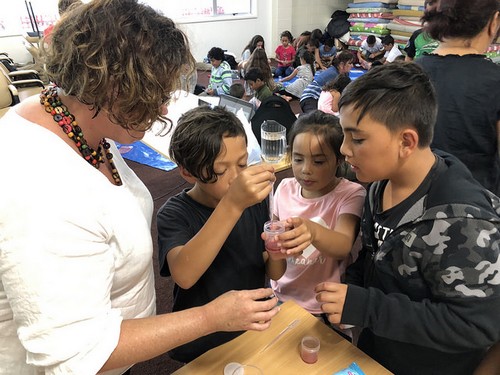
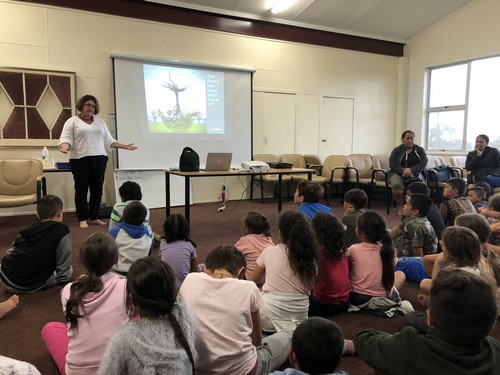
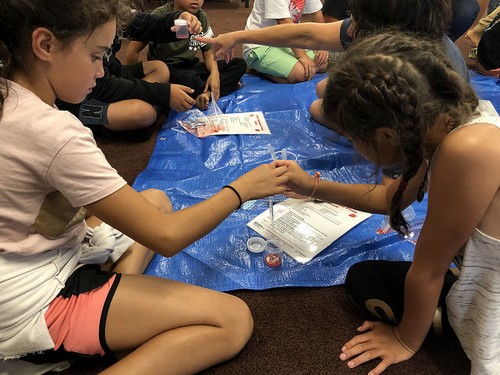
Rotorua’s first partnership school, to be run by Ngāti Whakaue, has confirmed its venue ahead of its official opening early next year.
Te Rangihakahaka Centre for Science and Technology will be based in a two-storey building on Dinsdale Rd.
The new school and its learning concept have been well received by the community, with more than 100 registrations of interest being lodged locally and from as far away as Australia.
Te Taumata o Ngāti Whakaue Iho-Ake Trust general manager Roana Bennett said the new school’s location was just “minutes from Rotorua CBD”.
“The two-storey building is very well constructed and is ideal for the learning spaces we want to create for our tamariki and whānau,” she said.
“The site name is Turipuku – a name that has a close association with Ngāti Whakaue and is highly appropriate for our school site.
“The ample park-like grounds will provide plenty of outdoor discovery areas for tamariki,” she said.
“We were fortunate to have a few options available to us but ultimately went with this venue because of its open spaces that we want to use to encourage collaboration across all age groups.”
Te Rangihakahaka Centre of Science and Technology will cover the full New Zealand curriculum but with a focus on science and technology, teaching literacy and other learning areas through science topics defined in Maori terms such as whakapapa (genetics) and ahuwhenua (agriculture).
It will be “trilingual” in English, Māori and computer coding.
Ms Bennett said the school was tracking well for its opening date of January 30.
“We have had huge interest being shown by families with Year 1 to 10 students. We have more than 100 registrations of interest, not just from Rotorua, but from other parts of New Zealand and even Australia.
“We don’t want to put our foundation team under too much pressure, but at the same time we don’t want to say no to any families so we will review how many children we take based on the registrations we get.”
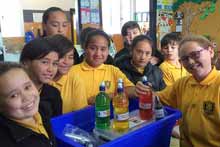 Ngati Whakaue, through Te Taumata o Ngati Whakaue Trust, is calling on local businesses to help support science in Rotorua schools.
Ngati Whakaue, through Te Taumata o Ngati Whakaue Trust, is calling on local businesses to help support science in Rotorua schools.
In a joint venture with Tauranga-based company House of Science, the Rotorua iwi is trialling ready-made science resource kits in Rotorua schools and if the pilot scheme is successful, is hoping to have 10 available for use by 2016.
Te Taumata’s Matakokiri project researcher Eva Tait said the iwi would seek sponsorship from Rotorua businesses to help buy the resource kits.
“We want to make Rotorua the science hub of New Zealand and this is a simple way for local businesses to get involved. We want to support teachers to incorporate science into their lessons, but many of our schools are having to work with outdated resources. The ready-made kits have everything a teacher could need,” Ms Tait said.
The House of Science kits cover themes in biology, chemistry, physics and food science, and are being trialled at Glenholme Primary, Kawaha Point School, Rotorua Intermediate and Rotorua Primary School.
Ms Tait said the scheme was an extension of the successful Matakokiri science and technology series of wananga run by Ngati Whakaue for learners aged 7 to 14. “We want to inspire our youth to study sciences and instill in them the understanding that science is all around us. The ready-made kits are an easy way of encouraging and supporting teachers to include more science in their classrooms. We augment the kits with local content and matauranga Maori (tribal knowledge),” she said.
“For example, if the children are doing a study of water, we may add in a component involving our local streams
and what’s important to us in Rotorua. Localising the knowledge and telling a story, or giving the information
about whakapapa works well and makes it relevant for our kids. We still teach the same concepts, but through a
cultural lens,” Ms Tait said.
One Rotorua business had already stepped up and was helping to develop a kit involving robotics. “They want to be a part of helping our youth become interested in those types of careers,” she said.
Te Taumata general manager Roana Bennett said the kits were a natural progression of the iwi education strategy that aims to raise educational achievement for Ngati Whakaue learners, and all learners within the tribal rohe (district). “Science is an exciting field of study and has the potential to engage kids and keep them in school for longer. It is the pathway to 60 per cent of career opportunities, if not more.”
Ms Bennett rejects the stereotyping of Maori learners as only being good with their hands and not academic. “That is a myth that was debunked decades ago. It is disappointing to still hear adults refer to this cliche. All learners should have the opportunity to go on to whatever career that inspires them. The real issue is to ensure that science is a valid option for all learners – and that includes Maori learners.
“We will do what we can to support the schools to include more science in the classroom. This is our expression
of tino rangatiratanga (self-determination) and one way we are supporting schools within our tribal boundary.”
By Matthew Martin
– Rotorua Daily Post
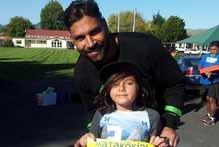 Ngati Whakaue actor Manu Bennett has spent the week in Rotorua taking part in a science and technology wananga with his eldest daughter.
Ngati Whakaue actor Manu Bennett has spent the week in Rotorua taking part in a science and technology wananga with his eldest daughter.
Bennett (Te Arawa/Ngati Kahungunu), who is best known for his roles in The Hobbit trilogy, and American television series Spartacus and Arrow, attended the seventh Matakokiri Wananga run by Te Taumata o Ngati Whakaue Iho Ake.
The wananga, aimed at inspiring Maori youth to study sciences in school, are infused with Ngati Whakaue tikanga (customs) and knowledge.
Read more:
Globetrotting Hobbit fans see Rotorua
Te Puia star to boost NZ tourism in US
Bennett said he believed such wananga (educational seminars) were important for his daughters Huia, 7, Pania, 4, and Mokoia, 3, to attend as they had been born and lived outside Rotorua, away from their Te Arawa whanau and culture.
“Coming to a wananga like this gives them the opportunity to be amongst the other Whakaue kids and feel what I believe is the wairua of the tribe,” he said.
“I think my daughter Huia felt a little uncomfortable when all the kids got up and started singing some of the Ngati Whakaue songs and she didn’t know them, so she sort of grabbed my leg and held on to me. But it’s up to me to help her learn. It’s important for her identity and just knowing herself. It’s something I didn’t get the
opportunity to do.”
He said he had been impressed with the opportunities given to the budding scientists which included visits to the Rotorua Hospital blood labs, Scion Crown Research Institute, and mountain biking through the Redwoods.
“I think the programme was really well established and I’ll definitely be bringing my other two daughters along once they’re old enough, that’s for sure.
“My work has had me overseas for the last couple of years so it’s also an opportunity to be doing something as a father with my children.”
Bennett is currently working on a fantasy novel series Shannara that is being filmed in New Zealand and said he hoped to be able to spend more time in Rotorua.
“I’ve always thought that one day I’d buy a house and be able to stay here and learn a bit more of my own
whakapapa. I’ll be looking for opportunities to be involved in these types of iwi wananga myself. It’s something
I’d like to walk alongside my daughters and do.”
By Lani Kereopa
– Rotorua Daily Post
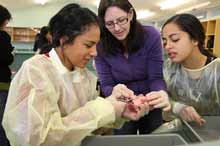
Local Maori high school students visited Waiariki Institute of Technology on a day excursion to help them explore the wonders of science.
Organised by Te Taumata o Ngati Whakaue Iho Ake Trust, Matakokiri is a science and technology wananga based on matauranga Maori (Maori understanding) for ages 7-15.
The recent visit to the Mokoia campus included working with the institute’s nursing team in the science and clinical labs. Also involved were Year 9 and 10 students registered with Kia Ora Hauora – a district health board-funded team set up to encourage and support rangatahi into sciences and on to health and medical-related study.
Trust general manager Roana Bennett told the Rotorua Daily Post earlier the wananga was always popular with only 50 places available.
“We started Matakokiri because we wanted to inspire our tamariki and rangatahi to take science in schools. Maori students studying science is proportionally not that high. Seventy per cent of jobs now are science-based so we wanted to keep all options available to them,” Ms Bennett said.
– Rotorua Daily Post



 Ngati Whakaue, through Te Taumata o Ngati Whakaue Trust, is calling on local businesses to help support science in Rotorua schools.
Ngati Whakaue, through Te Taumata o Ngati Whakaue Trust, is calling on local businesses to help support science in Rotorua schools. Ngati Whakaue actor Manu Bennett has spent the week in Rotorua taking part in a science and technology wananga with his eldest daughter.
Ngati Whakaue actor Manu Bennett has spent the week in Rotorua taking part in a science and technology wananga with his eldest daughter.